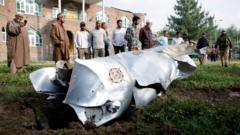The current diplomatic crisis was triggered by a brutal terrorist attack in Kashmir last month, resulting in ongoing military conflicts and international repercussions.
India-Pakistan Conflict Escalates Amid Terrorist Threats

India-Pakistan Conflict Escalates Amid Terrorist Threats
New insights reveal the complex tensions between India and Pakistan after a shocking attack in Kashmir.
In April, a terrorist assault claimed the lives of 26 civilians in Kashmir, upending the calm that the Indian government had portrayed in this disputed region. The attackers, emerging from wooded areas, targeted predominantly Hindu men, with many of the killings occurring before their families. This heinous act was attributed to a lesser-known group named the Resistance Front, which India claims serves as a proxy for broader terrorist activities emerging from Pakistan. The Indian government responded with military strikes against suspected targets within Pakistan, an action that has led to further escalation of tensions, as Pakistan denies involvement.
The Indian government has specifically pointed fingers at two notorious groups: Lashkar-e-Taiba and Jaish-e-Muhammad. Lashkar-e-Taiba, founded in the 1980s, has been accused of being behind some of the deadliest attacks in India, including the 2008 Mumbai attacks that left over 160 people dead. Although recognized internationally as a terrorist group and added to the U.N. sanctions list in 2005, Pakistan claims that it has banned the organization and that it no longer operates. However, many Indian officials assert that its remnants continue under various aliases, like the Resistance Front.
Jaish-e-Muhammad is another group that has historically been involved in violent acts against India, marked by the infamous 2001 attack on the Indian Parliament. Both organizations have been cited as central figures in the strife enduring in the Kashmir region, which continues to be a focal point of animosity between the two nations.
As the situation evolves, both countries are entrenched in a narrative of blame and retaliation, which raises concerns regarding future stability in South Asia.
The Indian government has specifically pointed fingers at two notorious groups: Lashkar-e-Taiba and Jaish-e-Muhammad. Lashkar-e-Taiba, founded in the 1980s, has been accused of being behind some of the deadliest attacks in India, including the 2008 Mumbai attacks that left over 160 people dead. Although recognized internationally as a terrorist group and added to the U.N. sanctions list in 2005, Pakistan claims that it has banned the organization and that it no longer operates. However, many Indian officials assert that its remnants continue under various aliases, like the Resistance Front.
Jaish-e-Muhammad is another group that has historically been involved in violent acts against India, marked by the infamous 2001 attack on the Indian Parliament. Both organizations have been cited as central figures in the strife enduring in the Kashmir region, which continues to be a focal point of animosity between the two nations.
As the situation evolves, both countries are entrenched in a narrative of blame and retaliation, which raises concerns regarding future stability in South Asia.


















